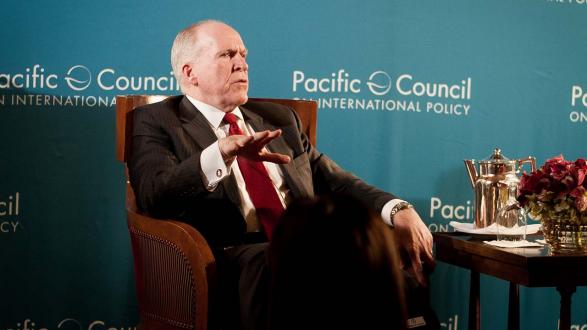On my last afternoon in the White House, shortly before turning in my badge and walking out the gate for the last time, I paid a visit to the small office in the basement of the West Wing to say goodbye to John Brennan, who was then working as Deputy National Security Advisor for Homeland Security and Counterterrorism. He was by himself in his office, pouring over an intimidating stack of folders whose contents would keep most of us awake at night.
While I knew that Brennan would go on to do important work in defense of our country, I could never have imagined what form that would take. During the two years I served on the National Security Council staff, I came to know Brennan’s humble demeanor and tireless dedication to his work. While we sometimes differed on policy, I never doubted that John Brennan’s head and heart were in the right place as he grappled with challenges that had no simple solutions.
The White House is sending an unmistakable message that it will treat criticism of the president’s behavior as a national security issue. It should be a cause of concern for all Americans.
This week, John Brennan is back in the news for a very different reason. On Wednesday, White House Press Secretary Sarah Huckabee Sanders announced that Brennan’s security clearance will be revoked due to his "unfounded and outrageous allegations, wild outbursts on the Internet and television about [the Trump] administration." She went on to accuse him of "lying" and of "increasingly frenzied commentary." The White House barely tried to conceal the reason Brennan is losing his security clearance: he is being punished for his vocal criticism of the president.
Granting and revoking security clearances is not something to be taken lightly and certainly should never be a tool of political pressure. In 2016, the Director of National Intelligence updated guidelines for how eligibility to continued access of classified information is determined. SecEA Directive 4 lays out 13 disqualifying conditions, ranging from foreign influence to personal conduct.
Based on Sanders’ statement, the White House seems to be claiming that Brennan either has "emotional, mental, and personality conditions [that] can impair judgement, reliability, or trustworthiness" or is guilty of "deliberate or negligent failure to comply with rules and regulations for handling protected information." Anyone who has worked with Brennan will attest that the first is absurd. If they are claiming that Brennan has abused his access to intelligence, they owe us more than insinuation.
John Brennan’s service to this country has proven him to be a good and honorable man. The president and his team should ask themselves if history will judge them as kindly.
As if to drive the point home, Sanders went on to provide a list of other officials at risk of losing their clearance. They all share one of two things in common: a willingness to publicly criticize the president or involvement in the ongoing investigation into possible collusion between the Trump campaign and the Kremlin. The White House is sending an unmistakable message that it will treat criticism of the president’s behavior as a national security issue. It should be a cause of concern for all Americans.
John Brennan’s service to this country has proven him to be a good and honorable man. The president and his team should ask themselves if history will judge them as kindly.
_______________________
Thomas Zimmerman is the Chief Programs Officer at the Pacific Council.
John Brennan spoke to Pacific Council members in February 2016, when he was the director of the Central Intelligence Agency, about working with Russia against the threat of terrorism. Watch the full conversation and a read a summary here.
The views and opinions expressed here are those of the author and do not necessarily reflect the official policy or position of the Pacific Council.




